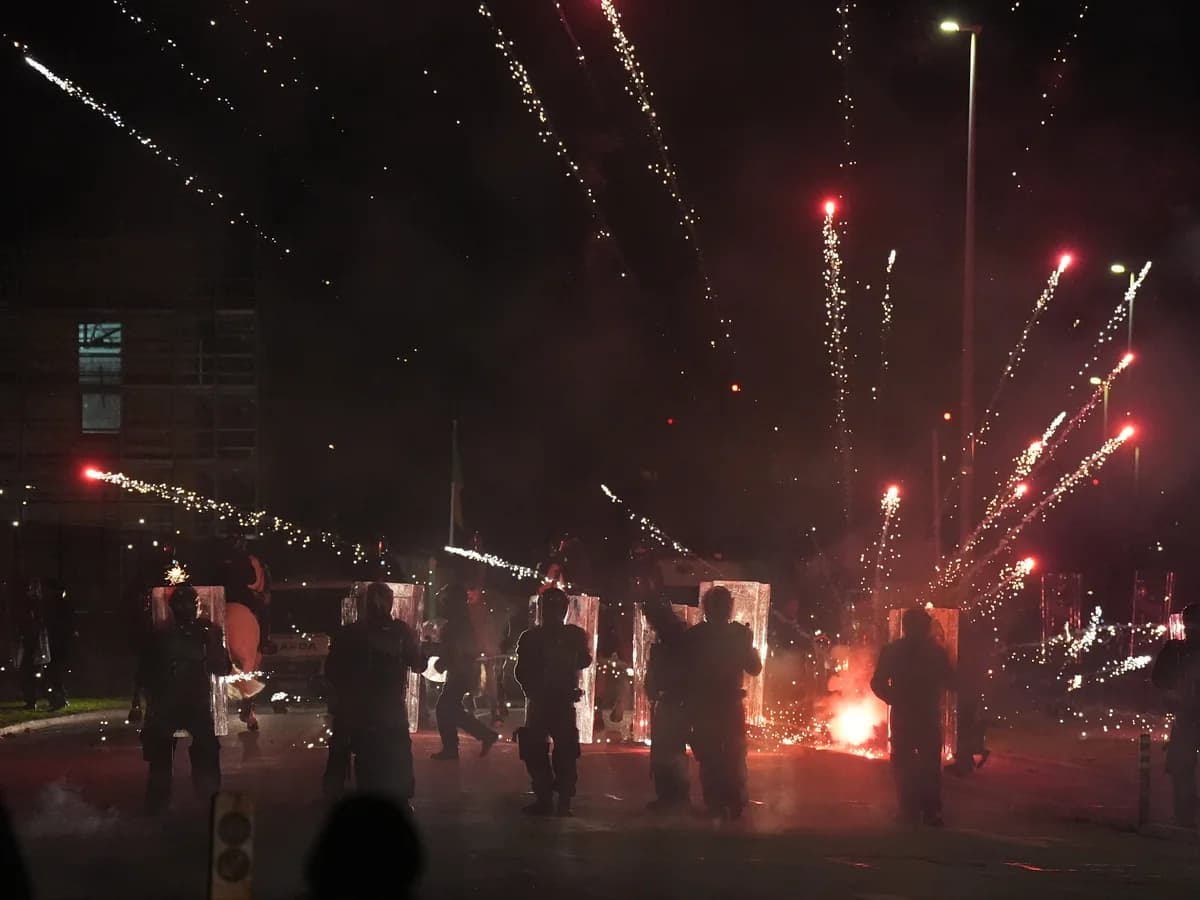We're loading the full news article for you. This includes the article content, images, author information, and related articles.
Violent demonstrations erupted in Dublin for a third consecutive night, targeting a hotel housing asylum seekers following an alleged sexual assault. The unrest highlights growing tensions surrounding immigration policies in Ireland, a situation with parallels to ongoing discussions

Dublin experienced a third night of intense protests on Wednesday, October 22, 2025, as hundreds gathered near the Citywest hotel, which accommodates asylum seekers. The demonstrations, marked by violence and clashes with police, were sparked by an alleged sexual assault of a 10-year-old girl in the vicinity of the hotel on Monday morning.
Irish police, An Garda Síochána, reported that 23 people were arrested during the hours-long standoff. Two officers were hospitalised with injuries after being struck by fireworks, stones, and other debris. Justice Minister Jim O’Callaghan condemned the "thuggish violence" and pledged a "robust response" to ongoing disorder.
The recent unrest is not an isolated incident but rather reflects simmering tensions around immigration and asylum in Ireland. Protests outside asylum seeker accommodations have become more frequent in Ireland, Northern Ireland, and Britain, often fueled by reports of crimes and amplified by anti-immigration and far-right groups. A similar riot occurred in central Dublin in November 2023 following a separate stabbing incident involving children.
Ireland's asylum process is governed by the International Protection Act 2015, which is informed by the 1951 Geneva Convention relating to the Status of Refugees. Asylum seekers can apply for international protection at a port of entry or the International Protection Office. While applications are processed, individuals are issued a temporary residence certificate and may be provided accommodation by the International Protection Accommodation Services (IPAS).
Kenya, a significant host country for refugees in Africa, has its own evolving framework for managing asylum seekers and refugees. The country hosts over 830,000 refugees and asylum seekers, primarily from Somalia and South Sudan. Historically, Kenya has operated under an encampment policy, restricting refugees to designated camps like Dadaab and Kakuma.
However, the Refugees Act of 2021 marks a significant shift, aiming to move away from a camp-based model towards more sustainable and inclusive solutions. This new legislation grants refugees the right to work, freedom of movement, and access to financial services, among other rights, if fully implemented. The government is currently developing regulations to guide the implementation of this Act.
In Dublin, the protests have seen hundreds of individuals, some waving Irish flags and chanting anti-immigration slogans, clashing with police. Justice Minister Jim O'Callaghan noted that the weaponisation of a crime by those seeking to sow dissent is not unexpected. Garda Commissioner Justin Kelly described the disorder as "thuggery" and not peaceful protest, with intent to damage property and intimidate.
In Kenya, organisations like UNHCR work closely with the government and partners to provide protection and assistance to refugees and advocate for their rights. The shift in policy aims to foster socio-economic inclusion and shared benefits for both refugees and host communities through initiatives like the Shirika Plan.
While Kenya's new Refugee Act offers progressive changes, challenges remain. The encampment policy, though evolving, has historically limited refugees' ability to integrate economically. Issues such as obtaining work permits and recognition of qualifications can be lengthy and complex. There are also concerns about funding shortfalls impacting essential services for refugees.
The experiences in other nations, such as the recent events in Dublin, underscore the potential for social tensions to escalate when communities perceive strains on resources or when criminal incidents are linked to migrant populations. For Kenya, successful implementation of the Refugee Act 2021 will require careful management of public perception, clear communication, and robust systems to ensure both national security and the rights of asylum seekers and refugees.
In Dublin, the identity of the 26-year-old man charged in connection with the alleged sexual assault cannot be publicly named due to Irish legal rules. This restriction, while protecting the integrity of the legal process, can sometimes fuel speculation and misinformation in the public domain, particularly in emotionally charged situations.
For Kenya, the full impact of the Refugee Act 2021 hinges on the detailed regulations currently being developed. The extent to which these regulations will facilitate genuine economic inclusion and address concerns from both refugee and host communities remains to be seen.
The situation in Dublin remains fluid, with authorities vowing continued robust responses to any further violence. The legal proceedings against the arrested individuals and the man charged with sexual assault will be closely watched. In Kenya, the development and implementation of the regulations for the Refugee Act 2021 will be critical. Stakeholders will be keen to observe how the government balances national security concerns with the expanded rights and integration opportunities for refugees, particularly in urban areas.
Keep the conversation in one place—threads here stay linked to the story and in the forums.
Sign in to start a discussion
Start a conversation about this story and keep it linked here.
Other hot threads
E-sports and Gaming Community in Kenya
Active 9 months ago
The Role of Technology in Modern Agriculture (AgriTech)
Active 9 months ago
Popular Recreational Activities Across Counties
Active 9 months ago
Investing in Youth Sports Development Programs
Active 9 months ago